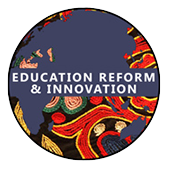
Education Reform and Innovation is developing practice by conducting high-quality research of educational policy and innovations.
ERI projects
ERI projects focus on improving the understanding of:
- Educational policy and practice
- Large-scale educational innovation
- Teacher preparation and teachers’ professional development
- Classroom teaching
- Well-being of schools
- Building the systems
The members of our team have been working in Kazakhstan since 2011. Read more case studies on the projects that ERI have been involved in.
Exploring Young People’s wellbeing and school engagement in Kazakhstan
- Phase One: 9 schools, 2621 survey participants aged 14-18; 21 interview/focus groups with stakeholders.
- Phases Two and Three: 22 schools, 3167 participants (1103 repeated measured); 81 interviews/focus groups with stakeholders.
- Phase Four: 20 schools, 1786 survey participants.
- Type of Project: Research
- Level/Grades: Secondary Sector: All older-age range school students.
The Faculty of Education and Nazarbeyev University Graduate School of Education partnered to conduct a large multi-phased study to examine constructs of wellbeing in Kazakhstan.
There were four major phases of research covering several regions (urban and rural locations) in each phase across Kazakhstan.
This collaborative piece of research was funded by the Newton Al-Farabi partnership programme and coordinated by the JSC Science Fund and British Council between April 2015 and May 2017.
The approach was to adapt Western constructs and scales of wellbeing to provide a culturally sensitive and appropriate instrument that will assist in identifying and then improving young people’s wellbeing across the older age range of students in secondary schools in Kazakhstan.
Objectives were:
- to examine how schools (i.e students, teachers, school psychologists) conceptualise students’ wellbeing and to track student measures of this during an academic year.
- To develop existing scales to ensure they are culturally appropriate for use in Kazakhstan. Thus adopt a sensitive approach to indigenous cultural factors in order to preclude the simple implementation of Western models.
- Provide a sustainable approach for examining the wellbeing of students in Kazakhstan irrespective of background.
- Improve the professional development of psychologists in Kazakhstan via exposure to current trends in international research-based practice.
Ministry of Education, The Sultanate of Oman
- Phase One: completed with a full 118-page baseline report sent to the client.
- Type of Project: Monitoring and Evaluation
- Level/Grades: Primary (basic education, Grades 1-4)
- Subjects: Maths and Science
In 2017 ERI visited Oman to design research instruments (qualitative and quantitative) for monitoring and evaluation of textbooks.
Participant groups included various stakeholders – students, teachers, school leadership personnel and members of the Ministry of Education, Oman.
Fieldwork was conducted and an online survey was provided in support of a baseline study. Analysis of the qualitative and quantities data was made to write a baseline report.
A national rollout of new textbooks with a new curriculum embedded therein and reform of Maths and Science has been implemented as of September 2017 in all Cycle 1 schools in Oman.
Field work was undertaken in six primary schools in Oman, including face to face semi structures interviews and focus groups. The research team met with 106 people (principles, vice principles, teachers and parents) and conducted ten interviews and twelve focus groups.
Grade 4 students were also consulted for their views on Maths and Science textbooks by means of another twelve focus groups. The online survey was delivered in Arabic and English, intended to be completed across Oman by teachers of Cycle One who taught the Field 2 topics of mathematics and science. Survey responses from 614 teachers in these schools are used in the analysis presented in the final report on baseline data (July 2017).
New textbooks for mathematics and science (Field 2) were commissioned from Cambridge University Press. The primary aim of the first phase of the baseline research study was to establish the pre-existing situation in order to understand how the introduction of the new textbooks to the Sultanate of Oman could be best monitored, evaluated and optimised.
The second phase of monitoring and evaluation will examine attitudes towards and use of new Maths and Sciences textbooks.

